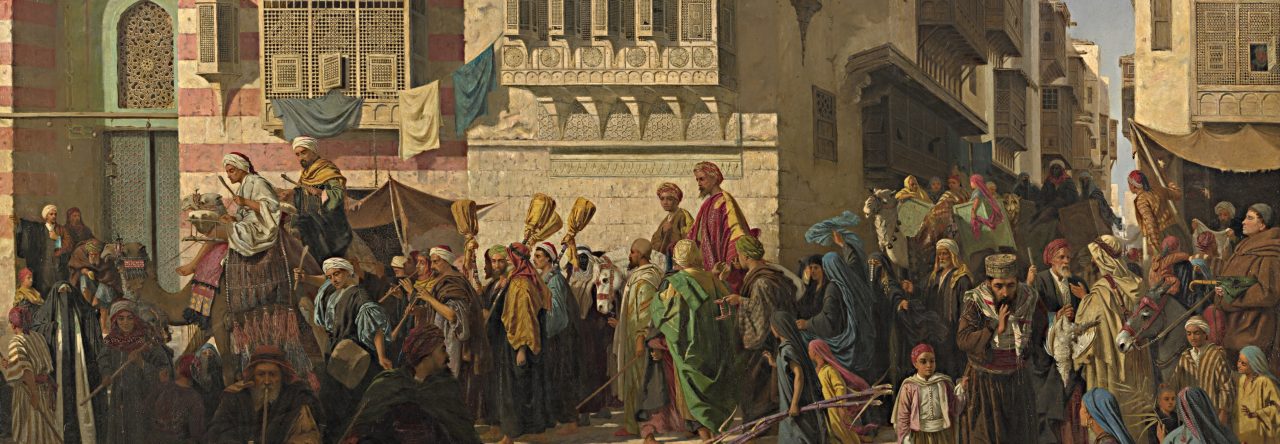
Of those queried, 52 responded, and so did I. Having skimmed Hall’s instructions, I forgot them when I got around to the chore: I thought he wanted ten books, in no particular order, and a comment on each. Maybe that’s why I don’t see my name on the list of respondents: I disqualified myself by not making a top choice. In any case, here’s my list in alphabetical order by author, with my original comment on each book. I did this in a hurry, and I wouldn’t fight to the death for every choice, but the list gives an idea of the approach that I value. (Caveat: I kept to books on modern history and politics. Otherwise I’d have filled up quickly with Oleg Grabar on Islamic art, S.D. Goitein on medieval Egypt, André Raymond on the Ottoman city—for starters.)
- The Arab Predicament by Fouad Ajami. Still the most eloquent and precise account of the impasse of Arab nationalism since independence.
- Islam in European Thought by Albert Hourani. Hourani wrote bad books but elegant essays, and these are some of his best, on a theme he knew best.
- Sayyid Jamal ad-din al-Afghani by Nikki R. Keddie. The ideal biography, masterful use of sources, correcting a hundred myths.
- The Chatham House Version by Elie Kedourie. I constantly reread these essays, which turn assumptions about nationalism and imperialism on their heads.
- Muslim Extremism in Egypt by Gilles Kepel. Pioneering on-the-ground reportage that preceded all accounts of Islamism and has yet to be surpassed.
- The Arab Cold War by Malcolm H. Kerr. No one had a better feel for the cut-and-thrust of inter-Arab politics.
- The Emergence of Modern Turkey by Bernard Lewis. Essential to understanding the late Ottoman period and the early Turkish republic.
- Cruelty and Silence by Kanan Makiya. Treason of the Arab intellectuals, exposed meticulously and passionately.
- A House of Many Mansions by Kamal S. Salibi. The best account (in essays) of the persistence of primordial identities.
- Nasser and His Generation by P.J. Vatikiotis. Nasser’s Egypt thoroughly revealed, at a time when other scholars engaged in social science obfuscation.
So much for my choices. Here are the first ten results of the survey, in descending order of preference—and to make it more interesting, I offer an irreverent aside on each selection.
- Orientalism by Edward Said. The bible of Middle Eastern studies. Specifically: the New Testament.
- The Old Social Classes and the Revolutionary Movements of Iraq by Hanna Batatu. Massive, Marxist, muddled.
- Arabic Thought in the Liberal Age by Albert Hourani. Once described to me, aptly, as a fossil collection.
- A History of the Arab Peoples by Albert Hourani. Wm. Roger Louis: “Albert watched with astonishment when it crept up the best-seller list of the New York Times and so did I because I thought it was almost unreadable.”
- The Venture of Islam by Marshall Hodgson. Has been compared to Ibn Khaldun. Really.
- Colonising Egypt by Timothy Mitchell. Cult book of a Saidian sub-sect based in the Village.
- The Mantle of the Prophet by Roy Mottahedeh. I read it, I enjoyed it, I forgot it.
- Contending Visions of the Middle East by Zachary Lockman. Crib of Orientalism that got the author elected president of MESA.
- Women and Gender in Islam by Leila Ahmed. No list (except mine) is complete without one.
- The Emergence of Modern Turkey by Bernard Lewis. At last, we agree on something.
There are another eleven books on the list, but the sample isn’t large enough for any of these choices to mean much. The same goes for an additional list of thirteen runners-up. (Do note this, however: nothing by Rashid Khalidi made the cut.)
Of course, a few fatal problems with the methodology and sample size render the survey worthless, so Garth Hall promises to do it again, presumably in a more systematic manner. No matter how many times he repeats it, two things are certain: Said’s Orientalism will come out on top, and my Ivory Towers on Sand won’t be anywhere in sight.
Update: Check out Robert Irwin’s best ten. Three of his choices overlap those in the survey.
